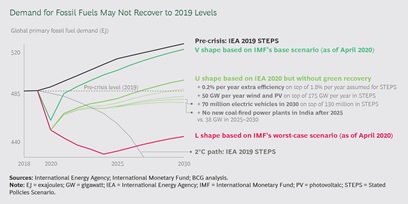
Peak Demand for Fossil Fuels in 2019 Has Become a Real Possibility
New Analysis by Boston Consulting Group Reveals That the COVID-19 Crisis May Have Accelerated Peak Demand for Fossil Fuel by More Than a Decade, Causing It to Reach Its Zenith in 2019
BOSTON,USA
Sallam Sallam
As the short-term economic fallout of the global COVID-19 pandemic becomes increasingly visible, recent research by Boston Consulting Group (BCG) suggests that the crisis may have a significant long-term impact on global energy markets. Most notably, it may have caused demand for fossil fuels to reach its peak last year. BCG’s article, titled Have We Passed Peak Demand for Fossil Fuels? explores energy scenarios through 2030.
BCG’s analysis of the future energy demand and energy mix for three economic scenarios, representing V-, U-, and L-shaped recoveries, points to a high likelihood that the current crisis will significantly slow world fossil fuel demand over the coming decade. In a scenario combining slower economic recovery with moderate acceleration of the transition from fossil fuels to renewables, as suggested by the “green recovery” measures currently introduced in many countries, demand would never recover beyond 2019 levels.
Demand for Fossil Fuels May Not Recover to 2019 Levels

In such a scenario, the impact would differ by commodity and by region. Coal is the fossil fuel least likely to recover, BCG expects. Meanwhile, demand for natural gas is likely to resume a growth path, and the trajectory for oil will put it somewhere between the other two.
“We may have reached a critical turning point for energy markets. The economic impact of the coronavirus pandemic, decreasingly energy-intensive economic growth, and continued investments in sustainable energy are hitting fossil fuel demand,” said Patrick Herhold, a managing director and partner at BCG. “This would fundamentally change the reality for many energy companies much earlier than they expected.”
Depending on the recovery scenario, energy companies’ margins and capital market standing will come under pressure. They will need to reduce costs and increase resilience against a longer-term environment of low prices, while at the same time accelerating efforts to transform their business portfolios, operations, and investment.
In the fight against climate change, reaching the crest of “peak fossil fuel” demand is no reason for complacency. “Peak demand for fossil fuels may be behind us, but not necessarily for the right reasons” said Jens Burchardt, an associate director at BCG. “If we do not fundamentally transform our economy, projected emissions remain incompatible with a 1.5°C or 2°C path. A low-price environment for fossil fuels will not make this transformation easier.”









